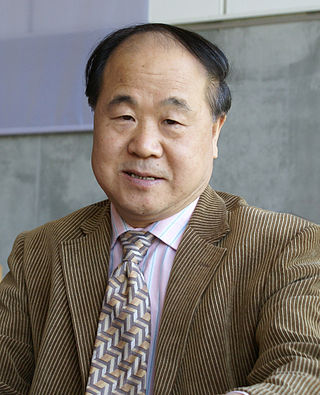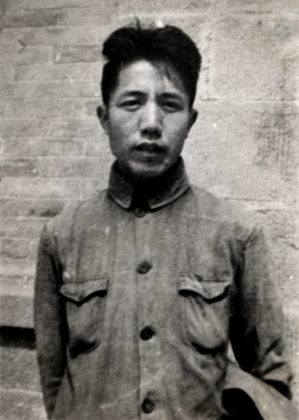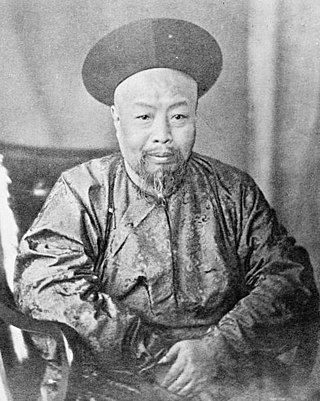Related Research Articles

Lu Xun, born Zhou Zhangshou, was a Chinese writer, literary critic, lecturer, and state servant. He was a leading figure of modern Chinese literature. Writing in vernacular and Literary Chinese, he was a short story writer, editor, translator, literary critic, essayist, poet, and designer. In the 1930s, he became the titular head of the League of Left-Wing Writers in Shanghai during republican-era China (1912–1949).

The Opium Wars were two conflicts waged between China and Western powers during the mid-19th century.

Jin Ping Mei —translated into English as The Plum in the Golden Vase or The Golden Lotus—is a Chinese novel of manners composed in vernacular Chinese during the latter half of the 16th century during the late Ming dynasty (1368–1644). Consisting of 100 chapters, it was published under the pseudonym Lanling Xiaoxiao Sheng (蘭陵笑笑生), "The Scoffing Scholar of Lanling," but the only clue to the actual identity is that the author hailed from Lanling County in present-day Shandong. The novel circulated in manuscript as early as 1596, and may have undergone revision up to its first printed edition in 1610. The most widely read recension, edited and published with commentaries by Zhang Zhupo in 1695, deleted or rewrote passages important in understanding the author's intentions.

Lin Zexu, courtesy name Yuanfu, was a Chinese political philosopher and politician. He was a head of state (Viceroy), Governor General, scholar-official, and under the Daoguang Emperor of the Qing dynasty best known for his role in the First Opium War of 1839–42. He was from Fuzhou, Fujian Province. Lin's forceful opposition to the opium trade was a primary catalyst for the First Opium War. He is praised for his constant position on the "moral high ground" in his fight, but he is also blamed for a rigid approach which failed to account for the domestic and international complexities of the problem. The Emperor endorsed the hardline policies and anti-drugs movement advocated by Lin, but placed all responsibility for the resulting disastrous Opium War onto Lin.

Guan Moye, better known by the pen name Mo Yan, is a Chinese novelist and short story writer. Donald Morrison of U.S. news magazine TIME referred to him as "one of the most famous, oft-banned and widely pirated of all Chinese writers", and Jim Leach called him the Chinese answer to Franz Kafka or Joseph Heller. In 2012, Mo was awarded the Nobel Prize in Literature for his work as a writer "who with hallucinatory realism merges folk tales, history and the contemporary".

Karl Friedrich August Gützlaff, anglicised as Charles Gutzlaff, was a German Lutheran missionary to the Far East, notable as one of the first Protestant missionaries in Bangkok, Thailand (1828) and in Korea (1832). He was also the first Lutheran missionary to China. He was a magistrate in Ningbo and Zhoushan and the second Chinese Secretary of the British administration in Hong Kong.

Zhou Yang or Chou Yang, courtesy name Qiying (起应), was a Chinese literary theorist, translator and Marxist thinker, active from the founding of the League of the Left-Wing Writers in 1930. In the 1930s he was notable for his sharp disagreements with other leftist writers, including Lu Xun, concerning leftist literary theory.

Tong Zhonggui, known by the pen name of Su Tong is a Chinese writer. He was born in Suzhou and lives in Nanjing.
David Hawkes was a British sinologist and translator. After he was introduced to Japanese through codebreaking during the Second World War, Hawkes studied Chinese and Japanese at Oxford University between 1945 and 1947, before studying at Peking University from 1948 to 1951. He then returned to Oxford, where he completed his D.Phil. and later became Shaw Professor of Chinese. In 1971, Hawkes resigned his position to focus entirely on his translation of the famous Chinese novel The Story of the Stone, which was published in three volumes between 1973 and 1980. He retired in 1984 to rural Wales before returning to live in Oxford in his final years.
Stella Tillyard FRSL is an English author and historian, educated at Oxford and Harvard Universities and the School of the Museum of Fine Arts, Boston. In 1999 her bestselling book Aristocrats was made into a six-part series for BBC1/Masterpiece Theatre sold to over 20 countries. Winner of the Meilleur Livre Étranger, the Longman/History Today Prize and the Fawcett Prize, she has taught at Harvard; the University of California, Los Angeles; Birkbeck, London and the Centre for Editing Lives and Letters at Queen Mary, London. She is a visiting professor in the Department of History, Classics and Archaeology, Birkbeck, University of London, and a Fellow of the Royal Society of Literature.

A Dictionary of Maqiao is a novel written by Chinese writer Han Shaogong. It was first published in 1996 and was translated into English by Julia Lovell in 2003. Yazhou Zhoukan selected it as one of the top 100 greatest Chinese novels in the 20th century.
Yishan, courtesy name Jingxuan, was a Manchu lesser noble and official of the Qing dynasty. He is best known for his failure to defend Guangzhou (Canton) from British forces during the First Opium War, and for signing the treaties of Kulja and Aigun with the Russian Empire in 1851 and 1858 respectively.

Ye Mingchen was a high-ranking Chinese official during the Qing dynasty, known for his resistance to British influence in Canton (Guangzhou) in the aftermath of the First Opium War and his role in the beginning of the Second Opium War.

Bi Feiyu is a Chinese writer. His works are known for their complex portrayal of the "female psyche." He has won some of the highest literary awards in China. He also wrote the screenplay for Zhang Yimou's 1996 film Shanghai Triad.

Frank Dikötter is a Dutch historian who specialises in modern China. Dikötter has been Chair Professor of Humanities at the University of Hong Kong since 2006. Prior to that, he taught modern Chinese history at the School of Oriental and African Studies at the University of London. He holds an honorary doctorate from Leiden University and is a senior fellow at the Hoover Institution of Stanford University.

Huang Juezi (1793 – 1853) was a Chinese Qing dynasty scholar and civil servant and a fervent opponent of the opium trade. His 1838 official memorial to the Daoguang Emperor detailing the problems caused by opium helped lead to the appointment of Lin Zexu as Imperial Commissioner responsible for tackling the opium problem, a move that would ultimately result in the First Opium War with Great Britain.

Gods and demons fiction or Shenmo fiction is a subgenre of Chinese fantasy fiction that revolves around the deities, immortals, demons and monsters of Chinese mythology. The term shenmo xiaoshuo, coined in the early 20th century by the writer and literary historian Lu Xun, literally means "gods and demons novel". Classical works of shenmo fiction include the novels Journey to the West and Investiture of the Gods.

The Big Red Book of Modern Chinese Literature is an anthology of Chinese literature edited by Yunte Huang and published in 2016 by W. W. Norton & Company. Huang, a professor of English at the University of California, Santa Barbara, described the book as a "search for the soul of modern China" in the introduction.
Chi-chen Wang was a Chinese-born American literary scholar and translator. He taught as a professor at Columbia University from 1929 until his retirement in 1965.

Imperial Twilight: The Opium War and the End of China's Last Golden Age is a history book by Stephen R. Platt relating the events during the lead-up to the First Opium War of 1839–1842. The book was well-received by critics, who were generally supportive of the conclusions Platt reached in the book.
References
- ↑ "Professor Julia Lovell — Department of History, Classics and Archaeology, Birkbeck, University of London". Birkbeck, University of London . Retrieved 16 March 2019.
- ↑ Abrahamsen, Eric (22 October 2015). "Julia Lovell". Paper-republic.org. Retrieved 13 June 2016.
- ↑ "Finalists". The Kiriyama Prize. Archived from the original on 18 June 2011. Retrieved 2 February 2011.
- 1 2 "The Jan Michalski Prize for Literature 2012".
- 1 2 "Awards made in 2010" (PDF). Archived from the original (PDF) on 8 December 2015. Retrieved 10 August 2015.
- ↑ "Penguin Classics". Penguin Classics. Retrieved 13 June 2016.
- ↑ Grey, Tobias (28 May 2019). "Robert Macfarlane and the Dark Side of Nature Writing (Published 2019)". The New York Times . ISSN 0362-4331 . Retrieved 7 October 2020.
- ↑ Mosca, Matthew W. (2015). "The Opium War: Drugs, Dreams and the Making of China. By Julia Lovell". The Journal of Asian Studies. 74 (2): 472–474. doi:10.1017/S0021911815000212. S2CID 163366425.
- ↑ Mitter, Rana (2 September 2011). "The Opium War (A review)". The Guardian .
- ↑ "Be Careful What you Wish For". The Economist . 29 October 2011.
- ↑ "China's Orwell". Time . 7 December 2009. p. 174.
- ↑ "Dr Julia Lovell". University of London website. Retrieved 9 August 2015.
- ↑ "Le Prix Jan Michalski 2012 attribué à Julia Lovell". Le Temps (in French). 22 November 2012. Retrieved 23 November 2012.[ permanent dead link ]
- ↑ "Baillie Gifford Prize for Non-Fiction shortlist revealed | The Bookseller". www.thebookseller.com. Retrieved 23 October 2019.
- ↑ "New Fellows 2019" (PDF). The British Academy . Retrieved 8 November 2019.
- ↑ "British scholar Julia Lovell wins McGill-run history prize for book on Maoism". www.citynews1130.com. Retrieved 15 November 2019.
- ↑ Van Fleet, John Darwin (31 January 2021). "Monkey King (Review)". Asian Review of Books. Retrieved 18 February 2021.
- ↑ Wasserstrom, Jeffrey (10 December 2020). "Julia Lovell on the Monkey King's Travels Across Borders: A Conversation". Los Angeles Review of Books. Retrieved 18 February 2021.
- ↑ Review my Minjie Chen, 'A Chinese Classic Journeys to the West: Julia Lovell’s Translation of “Monkey King”' in the Los Angeles Review of Books , 5 Oct 2021 https://lareviewofbooks.org/article/a-chinese-classic-journeys-to-the-west-julia-lovells-translation-of-monkey-king/ Retrieved 5 Oct 2021